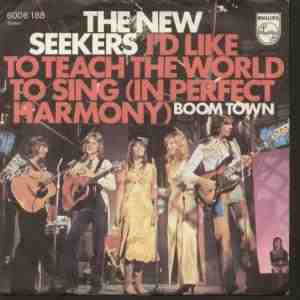
Advertising is a marketing communication that employs an openly sponsored, non-personal message to promote or sell a product, service or idea. Sponsors of advertising are typically businesses wishing to promote their products or services. Advertising is differentiated from public relations in that an advertiser pays for and has control over the message. It differs from personal selling in that the message is non-personal, i.e., not directed to a particular individual. Advertising is communicated through various mass media, including traditional media such as newspapers, magazines, television, radio, outdoor advertising or direct mail; and new media such as search results, blogs, social media, websites or text messages. The actual presentation of the message in a medium is referred to as an advertisement: advert or ad for short.

The iPod is a line of portable media players and multi-purpose pocket computers designed and marketed by Apple Inc. The first version was released on October 23, 2001, about 8+1⁄2 months after the Macintosh version of iTunes was released. As of May 28, 2019, only the iPod Touch remains in production.

"I'd Like to Teach the World to Sing " is a pop song that originated as the jingle "Buy the World a Coke" in the 1971 "Hilltop" television commercial for Coca-Cola and sung by The Hillside Singers. "Buy the World a Coke" was produced by Billy Davis and portrayed a positive message of hope and love, featuring a multicultural collection of teenagers on top of a hill appearing to sing the song.

A television advertisement is a span of television programming produced and paid for by an organization. It conveys a message promoting, and aiming to market, a product or service. Advertisers and marketers may refer to television commercials as TVCs.

Tango is a soft drink originating in the United Kingdom, primarily sold in the United Kingdom and Ireland. first launched by Corona in 1950. Corona was purchased by the Beecham Group in 1958, and Corona Soft Drinks by Britvic in 1987.
Switchers was an advertising campaign launched by Apple Computer, Inc. on June 10, 2002. It featured what the company referred to as "real people" who had "switched" from the Microsoft Windows platform to the Mac. An international television and print ad campaign directed users to a website where various "myths" about the Mac platform were "dispelled". The television commercials were directed by Errol Morris.

"Think different" is an advertising slogan used from 1997 to 2002 by Apple Computer, Inc., now named Apple Inc. The campaign was created by the Los Angeles office of advertising agency TBWA\Chiat\Day. The slogan has been widely taken as a response to IBM's slogan "Think." It was used in a television advertisement, several print advertisements, and several TV promos for Apple products.

The iPod Nano is a discontinued portable media player designed and formerly marketed by Apple Inc. The first generation model was introduced on 7 September 2005, as a replacement for the iPod Mini, using flash memory for storage. The iPod Nano went through several differing models, or generations, since its introduction. Apple discontinued the iPod Nano on July 27, 2017.
Chewits is the brand name of a cuboid-shaped, soft chewy sweet manufactured by Cloetta.

Wieden+Kennedy is an independent American advertising agency best known for its work for Nike. Founded by Dan Wieden and David Kennedy, and headquartered in Portland, Oregon, it is one of the largest independently owned advertising agencies in the world.

"Someday Baby" is a Grammy Award-winning blues song written and performed by American singer-songwriter Bob Dylan, released as the fifth track on his 2006 album Modern Times. The song had considerable success, garnering more airtime on U.S. radio than any other track on the album. It spent twenty weeks on Billboard's Adult Alternative Songs chart, peaking at #3 in November 2006. It was also anthologized on the compilation album Dylan in 2007.
Apple Inc. has had many notable advertisements since the 1980s. The "1984" Super Bowl commercial introduced the original Macintosh mimicking imagery from George Orwell's 1984. The 1990s Think Different campaign linked Apple to famous social figures such as John Lennon and Mahatma Gandhi, while also introducing "Think Different" as a new slogan for the company. Other popular advertising campaigns include the 2000s "iPod People", the 2002 Switch campaign, and most recently the Get a Mac campaign which ran from 2006 to 2009.

The iPod Classic is a discontinued portable media player created and formerly marketed by Apple Inc.
St George is a multi-award-winning television commercial for the British soft drink, Blackcurrant Tango. The commercial was created by Chas Bayfield and Jim Bolton at the UK advertising agency, HHCL + Partners and was directed by Colin Gregg at the production company Eclipse for the client David Atter at Britvic.

The Advertising Standards Authority (ASA) is the self-regulatory organisation of the advertising industry in the United Kingdom. The ASA is a non-statutory organisation and so cannot interpret or enforce legislation. However, its code of advertising practice broadly reflects legislation in many instances. The ASA is not funded by the British government, but by a levy on the advertising industry.

Apple Inc. has produced and sold headphones since 2001, available for standalone purchase and bundled with iPhone and iPod products. Apple's current product line consists of EarPods, wired earbuds available with a 3.5mm headphone or Lightning connector, AirPods and AirPods Pro, wireless Bluetooth earbuds, and AirPods Max, wireless Bluetooth over-ear headphones.

The Japanese technology company, Sony, engages in a variety of different marketing efforts, as one of the world's largest and most pervasive corporations. Sony's former slogans have been "The One and Only", "It's a Sony", "Go Create" (Europe), "like.no.other" and "make.believe". Its current slogan is "Be Moved".

American filmmaker Mark Romanek directed his first music video in 1986, for The The's "Sweet Bird of Truth". He earned his first MTV Video Music Award for Best Direction nomination for "Free Your Mind", performed by En Vogue, in 1993. Romanek later directed "Closer" for the industrial rock band Nine Inch Nails, which contains imagery involving terror, sexuality, and animal cruelty. In 1995, he directed the video for "Scream", set in space and performed by Michael and Janet Jackson, as well as the New Age surrealistic "Bedtime Story", performed by Madonna. They are two of the most expensive music videos ever made, costing $7 million and $5 million, respectively. "Scream" gained 11 nominations at the 1995 MTV Video Music Awards, including Romanek's second Best Direction nomination, and his first Grammy Award for Best Music Video, Short Form.

Changes is a British television advertisement launched in 1987 to promote the second-generation of the Volkswagen Golf. The 50-second ad was directed by David Bailey and stars the model Paula Hamilton as a woman throwing away some of her possessions. After discarding her wedding ring, pearl necklace, brooch and mink coat, she decides to keep her Volkswagen Golf and drives off in it with a smile on her face. Changes was named after the song that was used as its soundtrack, written by Alan Price. It was awarded the Silver prize at the 1988 British Arrows Awards, and is remembered as an indicator of car advertising's recognition of women's growing independence.

Ultra Tune is an Australian-owned franchised automotive servicing and roadside assist company with over 275 centres, making it the second largest independent automotive car servicing and repairer in Australia as of 2019.
















